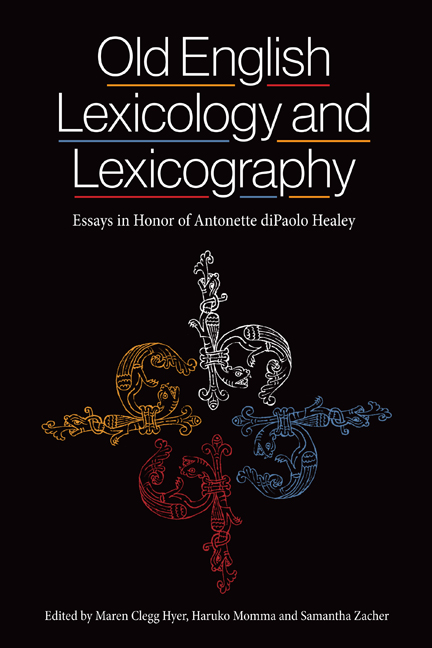Book contents
- Frontmatter
- Dedication
- Contents
- List of Illustrations
- List of Contributors
- Acknowledgements
- Abbreviations
- Introduction
- I Old English Poets and their Word-Craft
- 1 Beowulf and the Art of Invention
- 2 Juliana 53a Revisited (hætsð hæþenweoh)
- 3 Wounds and Compensation in the Old English Soul and Body Poems
- II Old English Homiletic Tradition
- 4 Defining and Redefining: Ælfric's Access to Gregory's Homiliae in Evangelia in the Composition of the Catholic Homilies
- 5 Lambeth Homily 4 and the Textual Tradition of the Visio Pauli
- 6 ‘A Vision of Souls’: Charity, Judgment, and the Utility of the Old English Vision of St. Paul
- 7 The Vocabulary of Sin and the Eight Cardinal Sins
- III Anglo-Saxon Institutions
- 8 The King (and Queen) and ‘I’: Self-Construction in Some Anglo-Saxon Royal Documents
- 9 Anglo-Saxon Maccabees: Political Theology in Ælfric's Lives of Saints
- 10 Nunne in Early Old English: Misogyny in its Literary Context
- IV Lexis of the Quotidian
- 11 Cingulum est custodiam: Semiotics and the Semantic Range of gyrdels
- 12 Island Time: The English Day and the Christian Hours
- 13 ‘Revising Hell’: The Voices of Teachers in Anglo-Saxon Studies and Anglo-Saxon England
- V The Task of the Lexicographer
- 14 Cryptography and the Lexicographer: Codifying the Code
- 15 Genre and the Dictionary of Old English
- Epilogue: Word-Hord
- 16 Reading Beowulf with Isidore's Etymologies
- An Old English Lexicon Dedicated to Toni Healey
- Toni Healey: A Tribute
- List of publications of Antonette diPaolo Healey
- Index
- Tabula Gratulatoria
- Miscellaneous Endmatter
- Anglo-Saxon Studies
Introduction
Published online by Cambridge University Press: 17 September 2020
- Frontmatter
- Dedication
- Contents
- List of Illustrations
- List of Contributors
- Acknowledgements
- Abbreviations
- Introduction
- I Old English Poets and their Word-Craft
- 1 Beowulf and the Art of Invention
- 2 Juliana 53a Revisited (hætsð hæþenweoh)
- 3 Wounds and Compensation in the Old English Soul and Body Poems
- II Old English Homiletic Tradition
- 4 Defining and Redefining: Ælfric's Access to Gregory's Homiliae in Evangelia in the Composition of the Catholic Homilies
- 5 Lambeth Homily 4 and the Textual Tradition of the Visio Pauli
- 6 ‘A Vision of Souls’: Charity, Judgment, and the Utility of the Old English Vision of St. Paul
- 7 The Vocabulary of Sin and the Eight Cardinal Sins
- III Anglo-Saxon Institutions
- 8 The King (and Queen) and ‘I’: Self-Construction in Some Anglo-Saxon Royal Documents
- 9 Anglo-Saxon Maccabees: Political Theology in Ælfric's Lives of Saints
- 10 Nunne in Early Old English: Misogyny in its Literary Context
- IV Lexis of the Quotidian
- 11 Cingulum est custodiam: Semiotics and the Semantic Range of gyrdels
- 12 Island Time: The English Day and the Christian Hours
- 13 ‘Revising Hell’: The Voices of Teachers in Anglo-Saxon Studies and Anglo-Saxon England
- V The Task of the Lexicographer
- 14 Cryptography and the Lexicographer: Codifying the Code
- 15 Genre and the Dictionary of Old English
- Epilogue: Word-Hord
- 16 Reading Beowulf with Isidore's Etymologies
- An Old English Lexicon Dedicated to Toni Healey
- Toni Healey: A Tribute
- List of publications of Antonette diPaolo Healey
- Index
- Tabula Gratulatoria
- Miscellaneous Endmatter
- Anglo-Saxon Studies
Summary
In the chapter she has contributed to the current volume, M. J. Toswell gives a pen-portrait of an ideal writer of a dictionary:
A lexicographer conducts a symphony, privately and perhaps silently. With every word, the dictionary-maker investigates and balances the semantics against the morphology, the syntax against the historical usages, the spellings and orthographic variants against the cognate languages. For every word, the balance of these elements must be exactly right, and is never exactly the same. (p. 229)
Those who read this passage will picture Professor Antonette diPaolo Healey perfecting the music of lexicography by working on one Old English word after another. Indeed, Professor Healey and other editors at the Dictionary of Old English project have produced thousands of lexicographical symphonies (that is, word entries) and enriched our field through the publications of word-albums (that is, fascicles). Every time we look up a word in the Dictionary of Old English (DOE), we can recognize the efforts of Toni and her colleagues to strike a balance among various components to create perfect harmony.
We are therefore very proud to present Professor Healey with this volume as ‘a small token’, to borrow from Roy Liuzza's chapter, of our ‘great gratitude – far more than words can express here – for her exemplary scholarship as well as her friendship and encouragement’ (p. 198). Professor Healey is many things to members in the field of Old English studies. Stephen Pelle reminds us that she has also published the editio princeps of the Old English Vision of St. Paul, a text that is of great interest not only to Anglo-Saxonists but also to scholars in many other fields (p. 80). As Damian Fleming points out, she is ‘an exceptional classroom teacher’ who ‘has surely earned a place in the field as exalted as Bede or Ælfric‘(p. 199). But above all, Professor Healey is without doubt the Old English lexicographer of our time: as Donald Scragg writes, ‘she will go down in the history of our subject with Joseph Bosworth and Thomas Northcote Toller’ (p. 228).
- Type
- Chapter
- Information
- Old English Lexicology and LexicographyEssays in Honor of Antonette diPaolo Healey, pp. 1 - 16Publisher: Boydell & BrewerPrint publication year: 2020



